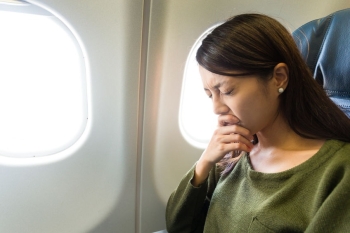
People have phobias about all types of things. You may have heard of people having a fear of heights, death, public speaking, and spiders. A very common phobia is aerophobia and refers to a fear of flying. Fear of flying can make it difficult for you to live your life.
A phobia is described as irrational fear, because the fear overrides logic. Even though you have looked up all the statistics on how safe you are on a plane, you are still overcome by fear and anxiety. Aerophobia is often linked to other phobias including acrophobia (fear of being at great heights), claustrophobia (fear of being restricted or confined), and/or agoraphobia (anxiety experienced by a person when they fear a situation to be unsafe).
If you have experienced a fear of flying you may be aware of how this fear impacts your brain and body. The symptoms associated with fear of flying can be broken into two categories: psychological (brain) and physiological (body).
Psychological symptoms of aerophobia (fear of flying) may include:
Disorientation or confusion
Hyperaware of surroundings
Dissociation (the sense of feeling disconnected from your body)
Sense of impending doom
Feeling powerless
Fear of dying
Realization that your feelings are excessive
Physiological symptoms of aerophobia (fear of flying) may include:
Sweating
Nausea
High blood pressure
Pounding or racing heart
Difficulty breathing
Crying
The symptoms listed above may make it very difficult to even want to work on managing the anxiety and fear associated with flying. When you experience a phobia you may have altered your life activities in order to boycott these negative feelings and experiences. Unfortunately, the need to fly for business, pleasure, or family may require you to confront your fear head on. Your fear of flying may have caused you to miss out on important business promotions family vacations, and life opportunities.
A perfect flight would be ideal to help eliminate your anxiety, but external factors such as turbulence, flight delays, and seat assignment may not always be factors that you can control. The one place you do have the ability to control is your mind. Instead of focusing on external factors, I want you to try an exercise that helps you focus on the internal factors related to your experience.
Practice this exercise.
Imagine a perfect flight. Do not focus on anything besides how your mind would be responding to the experience of flying. Think about the questions below. On a perfect flight how would your mind be responding to them?
What are the feelings you would be experiencing on a perfect flight?
What is the story that you are telling yourself about the beginning, middle, and end of this perfect flight?
What would you be telling yourself about how you feel about flying?
What positive experiences would you have about flying?
What would you say to yourself if you experienced turbulence?
How would you handle taking off and landing?
What coping mechanisms would you use if you notice yourself becoming anxious?
In what ways will you handle negative emotions or feelings?
How would you comfort yourself?
The anxiety and panic you feel about flying is a result of your thoughts. It takes some work and patience, but you do have the ability to change your thoughts. Right now, your thoughts about flying are very negative. It is important for you to develop a more positive mindset and story that you associate with flying to replace the negative story that is already present in your mind.
If you find yourself really struggling to overcome your fear of flying, and are too overwhelmed with the idea of starting on your own don’t hesitate to schedule a consultation. Each of our therapists is trained in helping clients develop the skills handle overcoming their phobias. To contact a fear of flying therapist at The Center for Growth call 215 922 LOVE (5683) x 100.
We work with people virtually in Florida, Georgia, New Jersey, Virginia. Pennsylvania, etc and inperson in Center City Philadelphia, Ocean City NJ, Mechnicsville VA just to name a few of our locations























